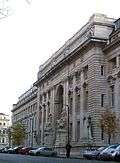Imperial College School of Medicine
Imperial College School of Medicine (ICSM) is the medical school of Imperial College London in England, and one of the United Hospitals. It is part of the college's Faculty of Medicine, and was formed by the merger of several historic medical schools, with core campuses at South Kensington, St Mary's, Charing Cross, Hammersmith and Chelsea and Westminster. The school ranked 4th in the world for medicine in the 2018 Times Higher Education World University Rankings.[1]
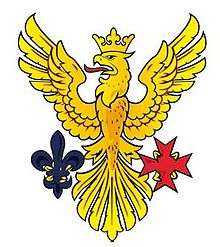 | ||||||||||
| Type | Medical school | |||||||||
|---|---|---|---|---|---|---|---|---|---|---|
| Established | 1821 (Charing Cross Hospital Medical School) 1834 (Westminster Hospital Medical School) 1854 (St Mary's Hospital Medical School) 1984 (Charing Cross and Westminster Medical School) 1997 (Imperial College School of Medicine) | |||||||||
| Dean | Professor Jonathan Weber | |||||||||
| Undergraduates | 2,200 | |||||||||
| Postgraduates | 240 | |||||||||
| Location | London , England | |||||||||
| Colours | Dark Blue, Red, Pale Blue, Gold | |||||||||
| Affiliations | Imperial College London | |||||||||
| Mascot | Phoenix | |||||||||
| Website | www | |||||||||
History
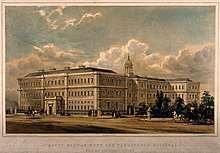
Imperial College London first gained a medical school by merger with St Mary's Medical School in 1988. The current School of Medicine was formed in 1997 by the merger of St Mary's Medical School with Charing Cross and Westminster Medical School (formerly Charing Cross Hospital Medical School and Westminster Hospital Medical School), the Royal Postgraduate Medical School and the National Heart and Lung Institute.
Organisation
Imperial College School of Medicine is the undergraduate teaching arm of Imperial's Faculty of Medicine,[2] which is organised into five departments: the Institute of Clinical Sciences, the School of Public Health (SPH), the Department of Medicine, the Department of Surgery & Cancer, and the National Heart and Lung Institute (NHLI).[3] The Faculty of Medicine also has close ties to the cross-faculty Institute of Global Health Innovation at Imperial.[4] Professor Jonathan Weber, an HIV expert and clinician by training, was appointed Dean of the Faculty of Medicine in May 2018.[5]
Unlike several other medical schools in the UK which are part of a life sciences department or similar, ICSM belongs to its own Faculty of Medicine. Furthermore, the school runs a number of courses besides the standard MBBS degree programme. These include the Imperial College MPH Programme. Teaching hospitals of the School are part of the Imperial College Healthcare NHS Trust, which was formed in 2007 and is the UK's first academic health science centre. All undergraduate students within the Faculty of Medicine (including Biomedical Science and Pharmacology BScs) are supported by the Imperial College School of Medicine Students' Union. The Faculty of Medicine also offers postgraduate MSc, MRes and PhD programmes, but these fall under the Graduate School of Life Sciences and Medicine, not the School of Medicine.
%2C_Imperial_College_Road.jpg)
Academics
Study
The school runs three undergraduate courses,[6] accepting approximately 280 first-time undergraduates each year (including 21 from outside the EU) for a six-year course leading to the award of an MBBS and BSc. Fifty graduates (including ten from outside the EU) are accepted for the five-year course that leads to the MBBS. Graduates of the school are also awarded the Associateship of Imperial College School of Medicine, AICSM, alongside their medical degrees.
Six-year MBBS/BSc
Teaching in the first two years is focused on the scientific basis of medicine with study focussing on a systems-based format, moving towards integrated disease and including clinical aspects later on. It also includes communication skills, medical ethics and law. Teaching comprises lectures, clinical demonstrations, tutorials, dissection, computer workshops, laboratory practical and clinical skills classes, independent study, and some problem-based learning.
Clinical experience in first year is provided by a patient contact course and in the second year with a three-week attachment in general medicine or surgery at one of the attached teaching hospitals.
Third year consists of three ten-week attachments in general medicine and surgery. Teaching consists of in-hospital clinical teaching, problem based learning within firms and a lecture programme delivered at one of the central teaching sites and via the faculty intranet. This year also consists of a 3-week background to clinical specialties course.
Fourth year involves study for the BSc, comprising 3 5-week modules then a 10-week supervised research project or specialist course, leading to a BSc (Hons) in Medical Sciences with one of the following: Cardiovascular sciences; Endocrinology; Gastroenterology and hepatology; Haematology; Immunity and infection; Management; Neuroscience and mental health; Reproductive and developmental sciences; Respiratory science; Surgery and anaesthesia. The following specialist courses are available instead of undertaking a research project: Medical humanities, History of medicine, Epidemiology and international health. BSc courses that have available places after the allocation of Imperial students are open to medical students from other universities who wish to intercalate.
Fifth year covers the specialties of obstetrics and gynaecology, radiology, paediatrics, psychiatry, oncology, general practice, critical care, infectious diseases, dermatology, rheumatology and orthopaedics through clinical attachments. It includes a 4-week course in clinical pathology at the start of the year and a one-week teaching skills course.
Final year consists of seven three-week clinical attachments in accident and emergency medicine; general practice; cardiology and radiology; ear, nose and throat, ophthalmology and renal medicine; two professional work experience attachments (one in medicine and one in surgery); one specialty choice module; an eight-week elective period which may be spent in the UK or overseas, and a practical medicine course, which provides specific preparation for the foundation year after graduation.[7]
Five-year graduate-entry MBBS
Despite only accepting graduates, this is still considered an undergraduate course. The first year is an accelerated programme, which is designed to bring students to the same level as someone who has completed Years 1 and 2 of the 6-year course. The second, third and fourth years of the graduate-entry course correspond to the third, fifth and final years of the six-year course respectively.[8]
Medical Biosciences
The School offers a 3-year BSc biomedical science degree which first commenced in 2006. The course was re-designed to reflect new teaching methods such as ‘flipped classroom’ and a laboratory heavy curriculum. Renamed Medical Biosciences, the course accepted its first cohort in 2017.
In the first and second years, students study fundamental human biology and the molecular basis of human disease. Modules on cellular and molecular biology and pharmacology underpin, for example, infectious diseases and immunology, cancer and neurobiology. Students will learn to ‘think like a scientist’ with a research-intensive, laboratory-focused curriculum, whilst workshops on critical health issues and modules in science communication and ethics will broaden their outlook and employability skills.
In the third year students will choose specialist modules, each of which examines a global health problem, and a final year project. Students will have the option to complete a 20-week intensive research project; a placement; or undertake a dissertation on a biomedical science topic. Placement possibilities may include industry, hospitals, publishing houses, museums, charities and government agencies.
Students also have the option of studying for a 4th year with Imperial College Business School, graduating in BSc Medical Biosciences with Management.
Rankings
The school ranks tied 4th in the world (with Stanford University), and 3rd in the UK, in the 2018 Times Higher Education rankings, as well as tied 11th (with UCSF) in the QS World University Rankings 2018. It is ranked 3rd for medicine in the 2018 Complete University Guide rankings,[9] 11th in the UK by the Guardian University Guide 2018,[10] and 2nd in the UK for research in the latest RAE in 2008, behind Edinburgh.
Student life
ICSM Students' Union
In contrast to other British universities where medical students may merely be part of a "Medsoc", the School of Medicine has its own complete union. Imperial College School of Medicine Students' Union is a subsidiary part of Imperial College Union, and medical and BSc students are members of both. As such, they may join any of the 300 ICU clubs and societies and take up positions of responsibility in them. However, over 40 of these clubs and societies are under the direct jurisdiction of ICSMSU. Further, the medical students' union also owns the Reynolds building at the Charing Cross Hospital campus, as medical students live or spend more time around that area than the South Kensington campus. The Reynolds Bar represents the heart and soul of ICSM, and regularly plays host to themed parties or "Bops". It also fulfils the role of a normal student bar, where medical students can congregate and socialise whilst enjoying the occasional pint at a lower price than the average London pub.
ICSM Gazette
The ICSM Gazette is the magazine of the Medical School, derived from the publications of the founder schools: the St Mary's gazette, Charing Cross gazette and the Westminster Broadway. Copies of the Broadway since 1948 are available from the Imperial College archives and issues of the St Mary's Gazette since 1894 are collected in the St Mary's archives. The magazine in its current format is produced twice a year, containing a Dean's column from the Associate Dean and Head of the Undergraduate School of Medicine. In addition, there is a report from the Students' Union and sections for news, alumni, events, academics, features, careers, travel and clubs and societies. Articles are also published online and previous issues of the gazette are available on the website.[11]
Shrove Tuesday Final Year Dinner
The Shrove Tuesday Dinner started in 1940 during the Blitz at the old Westminster Hospital Medical School. Students and house staff decided to have dinner to alleviate the oppressive mood. A senior member of staff was invited to address the assembled doctors and whilst he was talking a caricature was sketched on the tablecloth by one of his audience. It was cut out, passed round, signed and mounted and started the unbroken tradition that has evolved into the Shrove Tuesday Final Year Dinner that has continued even after the amalgamation of Westminster Hospital Medical School into Charing Cross Hospital Medical School and then Imperial College School of Medicine.[12]
Alumni associations
The ICSM Alumni Association was founded in 2004 with the graduation of the first cohort of ICSM doctors.[13] Still in its infancy, it is jointly run with help from ICSMSU and members of the alumni. The association aims to provide funding for the clubs and societies of the medical school, as well as offer support to students.
Two other alumni associations also exist for graduates of the original medical schools - the St Mary's Association and the Charing Cross and Westminster Alumni.
Campuses and associated hospitals
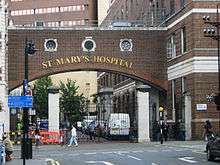
The School's teaching campuses include:
- Undergraduate campus
- South Kensington campus - Sir Alexander Fleming Building
- Charing Cross Hospital campus - The Reynolds Building
- Hammersmith Hospital campus - Wolfson Education Centre
- Main teaching hospitals
- Charing Cross Hospital
- St Mary's Hospital
- Chelsea & Westminster Hospital
- Hammersmith Hospital
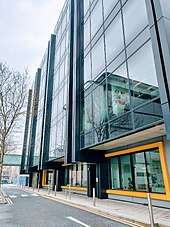
Students in the 1st and 2nd years as well as those on the BSc courses attend lectures and labs mainly at the main campuses. Parts of the 4th year, as well as other clinical modules are also held at the postgraduate hospitals, where much of the School's research is based:
- Postgraduate hospitals
- Royal Brompton Hospital
- Harefield Hospital
- Queen Charlotte's & Chelsea Hospital
- Western Eye Hospital
- District general hospitals
- Ashford Hospital
- Central Middlesex Hospital
- Ealing Hospital
- Hillingdon Hospital
- Mount Vernon Hospital
- Northwick Park Hospital
- St Mark's Hospital
- West Middlesex Hospital
- St Peter's Hospital, Chertsey
- Mental health hospitals
- St. Bernard's Hospital
- St. Charles' Hospital
- Three Bridges Medium Secure Unit
- Gordon Hospital
- Broadmoor Hospital
- Cassel Hospital
Clinical attachments and teaching in years 2 (three weeks), 3 (30 weeks), 5 and 6 (all year) are held at these hospitals. These hospitals also have small research divisions which are part of the Imperial College Faculty of Medicine.
Notable staff and alumni
The list below, including five Nobel Laureates in Physiology and Medicine, shows the notable past or current staff and alumni from Imperial College School of Medicine or from the various institutions which are now part of it.
- Christopher Addison (Ex Leader of the House of Lords, Ex Minister for Health) Charing Cross Hospital
- N.H. Ashton (ophthalmologist, Buchanan medalist)
- Sir Ernst Chain (Nobel Laureate, Physiology and Medicine)
- Ara Darzi, Baron Darzi of Denham, Parliamentary Under-Secretary, Leading Surgeon) St Mary's Hospital
- Carl Djerassi (chemist; first oral contraceptive pill progestin norethisterone)
- Harold Ellis (surgeon and anatomist) Westminster Hospital
- Sir Joseph Fayrer (physician noted for his writings on medicine in India)
- Sir Marc Feldmann (expert on rheumatology) Kennedy Institute / Charing Cross Hospital
- Sir Alexander Fleming (Nobel Laureate, Physiology and Medicine) St Mary's Hospital
- Sir Malcolm Green, (respiratory physiologist), vice-president faculty of medicine and head of National Heart and Lung Institute.
- John Henry (clinical toxicologist who did crucial work on poisoning and drug overdose) St Mary's Hospital
- Sir Frederick Hopkins (Nobel Laureate, Physiology and Medicine)
- Dame Rosalind Hurley (medical microbiologist, researcher, and ethicist)
- Sir Andrew Huxley (Nobel Laureate, Physiology and Medicine)
- Thomas Huxley (notable biologist) Charing Cross Hospital
- Sir Bruce Keogh (medical director of the National Health Service)
- Dame Louise Lake-Tack, Governor-General of Antigua and Barbuda Charing Cross Hospital
- David Livingstone (congregationalist pioneer medical missionary in South Africa) Charing Cross Hospital
- Sir Ravinder Nath Maini (expert on Rheumatology) Kennedy Institute/Charing Cross Hospital
- Christine Moffatt (nurse in leg ulcer care) Charing Cross Hospital
- Albert Neuberger (chemical pathologist) St Mary's Hospital
- William Kitchen Parker (physician and zoologist) Charing Cross Hospital
- Sir William Stanley Peart (Buchanan Medalist) St Mary's Hospital
- Dame Julia Polak (tissue engineer)
- Sir Rodney Robert Porter (Nobel Laureate, Physiology and Medicine)
- Lady Ann Redgrave (orthopaedic surgery, ex Chief Medical Officer of GB Rowing) Charing Cross Hospital
- Sir Bernard Spilsbury (pathologist and one of the pioneers of modern forensic medicine)
- Baroness Edith Summerskill (Politician) Charing Cross Hospital
- Joseph Toynbee (otologist) St Mary's Hospital
- Augustus Waller (the invention of the electrocardiogram (ECG))
- Professor Stephen Westaby (Pioneer in Cardiothoracic Surgery and Bioengineering)
- Sir Almroth Wright (advanced vaccination through the use of autogenous vaccines) St Mary's Hospital
- Sir Magdi Yacoub (expert cardiothoracic surgeon)
- Sir Roger Bannister (neurologist, runner of the first four-minute mile) St Mary's Hospital
- Jane Yardley, (author) Charing Cross Hospital
- Adam Kay, writer and comedian
References
- "World University Rankings 2018 by subject: clinical, pre-clinical and health". Times Higher Education. Retrieved 18 September 2018.
- "Undergraduate". Imperial College London. Retrieved 2018-08-13.
- "Departments". Imperial College London. Retrieved 2018-08-13.
- "Institute of Global Health Innovation | Imperial College London". www.imperial.ac.uk. Retrieved 2018-08-13.
- "Professor Jonathan Weber appointed Dean of Imperial's Faculty of Medicine | Imperial News | Imperial College London". Imperial News. Retrieved 2018-08-13.
- "School of Medicine | Study | Undergraduate". Imperial College. Retrieved 18 September 2018.
- "Course structure". Imperial College. Retrieved 28 May 2013.
- "Medicine gradentry". Imperial College. Retrieved 28 May 2013.
- "Complete University Guide". Complete University Guide. Retrieved 7 May 2015.
- "University League Tables 2018". The Guardian. Retrieved 18 September 2018.
- "ICSM Gazette". ICSM Gazette. Retrieved 2018-10-19.
- "Shrove Tuesday Final Year Dinner 2019". www.stfyd.co.uk. Retrieved 2018-10-22.
- "ICSM Alumni". www.union.ic.ac.uk.
